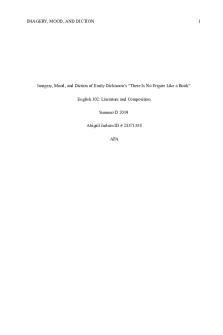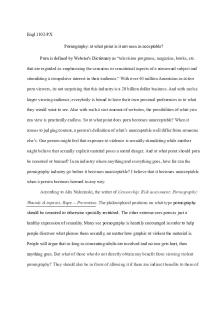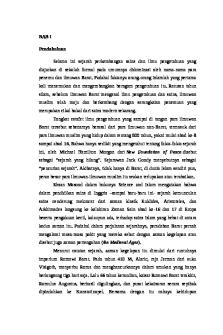Essay \"Understanding Islam and Muslim Societies\" - grade 80% PDF

| Title | Essay \"Understanding Islam and Muslim Societies\" - grade 80% |
|---|---|
| Course | Understanding Islam and Muslim Societies |
| Institution | University of Melbourne |
| Pages | 5 |
| File Size | 163.8 KB |
| File Type | |
| Total Downloads | 55 |
| Total Views | 134 |
Summary
Understanding Islam and Muslim Societies...
Description
Understanding Islam and Muslim Societies What is ijtihad? Has the gate of ijtihad really closed? Under what influences has Islamic law been redefined? Why is ijtihad significant for contemporary Muslim societies? The topic of ijtihad is a very controversial one in modern times. Many Muslims may think or ask themselves the question about how and from where the concept of ijtihad originally originated and why should one practice taqlid (blind imitation). The literal meaning of ijtihad is to make utmost effort in a matter that requires difficulty. In Islamic terminology ijtihad means to derive and deduce religious opinion about some matter that is not mentioned in the basic sources of Islamic law which are the Quran and Sunnah. Ijtihad is the area in which Islam is silent and one must use one’s common sense, intellect and experience to arrive at an opinion that should be in conformity with the spirit of Islam. For example, matters like testtube babies, organ donation and cloning are some of the recent developments in science and one needs to know whether they are permitted by religion or not. It is in such matters that need for ijtihad arises. The term ijtihad originally originated from a conversation between the Prophet Muhammad (peace be upon him) and one of his companions Mu‘adh Ibn Jabal at the time when the latter was being sent by him to govern the territory of Yemen, the Prophet asked ‘How will you judge the cases [that come to you]?’ He replied: ‘I will judge according to the Book of Allah’. ‘But if you do not get anything there, what will you do?’ the Prophet (pbuh) asked. He said: ‘I will refer to the Sunnah of the Prophet (pbuh)’. ‘But if you do not get it even there, what will you do?’ the Prophet (pbuh) asked again. He replied: ‘I will exercise my judgement.’ Hearing this, Prophet (pbuh) patted Mu‘adh on the shoulder and said: ‘Praise be to Allah who has guided the Messenger of His Messenger to what pleases His Messenger’. ( Nisa’i: No. 1327) Ijtihad is one of the four sources of Sunni law, it is recognized as the decision making process in Islamic law ( shari’a) through personal effort (jihad), which is completely independent of any school of jurisprudence ( fiqh). As opposed to taqlid (blind imitation) , it requires a “thorough knowledge of theology, revealed texts and legal theory; an exceptional capacity for legal reasoning; thorough knowledge of Arabic.” By using both the Qur’an and Hadith as resources, the scholar is required to carefully rely on analogical reasoning to find a solution to a legal
problem, which is considered to be a religious duty for the mujtahid. Thus, a mujtahid is recognized as an Islamic scholar who is competent in interpreting shari’a by ijtihad. Today, there are many different opinions surrounding the role of ijtihad in modern society, and whether or not the “doors of ijtihad are closed.” There are 2 types of rules or laws in Islam. The first is katayi or definitive, these laws are stated clearly in the Quran and the Sunnah and they cannot be changed and thus ijtihad in this area is not allowed and forbidden. The other types of laws are those which are not very clear in any of the texts and so need to be dealt with ijtihad. If a mujtahid passes a judgement which is not in the Book (the Qur'an) or the Sunnah, according to his own thought and his own opinion. This is technically called ijtihad alra'y. According to Shi’i Islam, this kind of ijtihad is forbidden, but in Sunni Islam it is permitted. In the Sunni school of thought, the sources of legislation and the valid proofs for determining the shari’a, are given as the Book, the Sunnah and ijtihad. The Sunnis place ijtihad on the same level as the Quran and the Sunnah. This difference arises because the Sunni Muslims believe that the laws and instructions given in the Quran and Sunnah are finite while in actual life you may encounter many different circumstances which could be very hard to relate to any of the Primary texts and so ijtihad alra'y is valued equally important as the Quran and Sunnah in the Sunni school of thought. There are certain criteria’s that must be fulfilled before a person can do ijtihad, and they are as follows: Learning the Arabic language to the extent that is required. Knowledge of the colloquialism of Arabic and the language of the people to whom the Qur’an and the Sunnah was addressed to. Knowledge of Commentary (tafseer) of the Qur’an. Logic. Every branch of learning in which reasoning is used needs logic (understanding). The study of hadith. Knowledge of the transmitters of hadith, to the extent where one is able to discern the validity of the hadith. The study of the principles of fiqh (jurisprudence). Thorough research and study of the views of others. Striving to make use of all of one’s abilities in deducing the rules.
Review of the verdicts and narrations of the Sunnah. If the above criteria is met by a person he can then be called a mujtahid. The mujtahid then uses the following four sources to come to conclusion on matters which need to be dealt with using ijtihad: The Quran: This is the first source of Islamic law which is the word of god sent down to mankind through Prophet Muhammad (pbuh). Approximately 8% of the Quran pertains to laws and their punishments. The Sunnah: It is the words, actions and assertions of Prophet Muhammad (pbuh). This is secondary to the Quran. The most important thing in any reported Sunnah is its Isnad which is the line of narrators which defines its authenticity. Ijmaa (consensus) : Consensus means the general agreement of the Muslim scholars of a particular period on a particular issue. Consensus in its own right is not binding, and must be supported by the Sunnah. Aql (Reason): What is meant here is that sometimes a law of shari’a is determined by the proof of reason. The shari’a law including all 4 of its elements are there to help and guide human beings to live the life that is in the best interest of mankind allowing what is good for us and denying what is harmful, and thus it also agrees with our laws of reasoning and thus leads to ijtihad. For example in the days of prophet Muhammad (pbuh) there were no lab made recreational drugs like cocaine or methamphetamine and so we have no narrated proofs of it being allowed in the Quran or Sunnah. With our reason and knowledge and on the basis that it is harmful to one in the long term and so looking at that we come to the conclusion that it is forbidden in Islam as the shari’a does not allow anything that causes harm to oneself. Has the gate of ijtihad really closed? When looking at this question we come across the idea that many scholars in the past believed that the doors of ijtihad have been closed and the reason we find behind this ruling is that it would provide immunity to the shari’a and so no person or government would be able to exploit this source of governing for their benefit. Another reason may be because the requirements for conducting ijtihad are quite extensive as outlined above and it was almost humanly impossible to achieve all. Hallaq has rejected the opinions of these scholars and claims that the fatwas (legal opinion) that appeared from the fourth to the 10th century was all based on ijtihad. In his article Hallaq presents 4 points to prove that the gate of ijtihad was never closed both in theory and in practice:
1. The controversy about closure of gate of ijtihad and extinction of Mujtahid prevented jurists reaching a consensus to that effect 2. Up to 500 AH, there was no phrase or any other expressions pointing towards closure 3. Ijtihad was used in developing the positive law after the formation of schools 4. Jurist capable of ijtihad existed all the time However this idiom, "the door of ijtihad" is not right, some of them even say that the entryway of ijtihad was shut in the fourth Islamic century AH, some say in the fifth Islamic century AH and some say that the last mujtahid was Ibn Daqeeq al-'Eeid. Some of them say that "after Abu Hamid al-Ghazzalee there was never a mujtahid mutlaq" and numerous different articulations with respect to this issue. We say: do you not see? Where is the entryway of ijtihad so we can see it and reveal it discover whether it is shut or not? Is there even anything called “the gate of ijtihad”? No! There is however something called: “the conditions of ijtihad” and Allah’s virtue is not a monopoly for anyone as Allah opened up the way for some of the later scholars that which he did not open up for the earlier scholars. Even though the earlier scholars are better than the later scholars this is not for every single one, so why would Allah restrict and limit his virtue? The facts of the matter that relates to the Ummah is that there is no restriction placed upon it and the texts of the Quran and Sunnah are restricted and there is no answer to these facts (about the Ummah having no restrictions placed on it) except with ijtiad. For there will not cease to be a group from this Ummah that are established on the deen (faith) of Allah until the Hour is established. So there is no issue that arises except that it has its Divinely Legislated ruling and, as is the correct view of the Muslim scholars, the Earth will not be left without one who will stand firm for Allah with proofs because the pure group is manifest under the Hour is established. Ijtihad does not have a “gate” so whoever says “the gate of ijtihad is closed” or “open” is mistaken. Ijtihad has conditions, so it is haram for a man to do ijtihad until and unless the conditions of ijtihad have been maintained. The most agreed upon opinion by most of the scholars regarding ijtihad is that it has parts, in the sense that ijtihad can be done on some issues while not on others. It has been mentioned that the most knowledgeable person about halaal and haram was Muad’h, a companion of the holy prophet (pbuh) while Ali, Prophet Muhammads cousin, was most wise in the laws regarding fair judgement. Zay’d another companion of the holy prophet was most knowledgeable regarding faraaiz (Religious obligations). This shows that a person would be better suited to do ijtihad in a specific type of matters in which he is most knowledgeable about. This would be more like division of labour which can be seen in most places in modern
societies. Ijtihad has conditions and when these are maintained and ascertained, after looking at the time and place, then the Muslim can make ijtihad, yet when these conditions are overlooked or opposed then at this point it is haram for a person to make ijtihad, and Allah knows best. In conclusion we see that Islam is the fastest growing religion in the world and for it to survive it has to adapt to the changing lifestyle of people. The basic principal around which the shari’a law is based is to provide a perfect way of life for its followers of all times. So as the lifestyle of people change with the modernizing world so will the laws, so as to suit the problems faced today and this can only be done with the help of ijtihad. Without the tool of ijtihad, the gap between Islamic theory or aspirations and contemporary reality or constraints becomes impossible to bridge....
Similar Free PDFs

Poetry Essay - Grade: 80%
- 6 Pages

Essay 3 - Grade: 80
- 4 Pages

ECH 80 Essay 1 - Grade: A-
- 2 Pages

Types Of Societies - Grade: B
- 2 Pages

Apple - Grade: 80
- 8 Pages

A1 - Grade: 80
- 5 Pages

Gout(notes) - Grade: 80
- 3 Pages

HD sample - Grade: 80%
- 16 Pages

Business summative - Grade: 80
- 17 Pages

FADO Music - Grade: 80%
- 7 Pages

Islam Essay
- 5 Pages
Popular Institutions
- Tinajero National High School - Annex
- Politeknik Caltex Riau
- Yokohama City University
- SGT University
- University of Al-Qadisiyah
- Divine Word College of Vigan
- Techniek College Rotterdam
- Universidade de Santiago
- Universiti Teknologi MARA Cawangan Johor Kampus Pasir Gudang
- Poltekkes Kemenkes Yogyakarta
- Baguio City National High School
- Colegio san marcos
- preparatoria uno
- Centro de Bachillerato Tecnológico Industrial y de Servicios No. 107
- Dalian Maritime University
- Quang Trung Secondary School
- Colegio Tecnológico en Informática
- Corporación Regional de Educación Superior
- Grupo CEDVA
- Dar Al Uloom University
- Centro de Estudios Preuniversitarios de la Universidad Nacional de Ingeniería
- 上智大学
- Aakash International School, Nuna Majara
- San Felipe Neri Catholic School
- Kang Chiao International School - New Taipei City
- Misamis Occidental National High School
- Institución Educativa Escuela Normal Juan Ladrilleros
- Kolehiyo ng Pantukan
- Batanes State College
- Instituto Continental
- Sekolah Menengah Kejuruan Kesehatan Kaltara (Tarakan)
- Colegio de La Inmaculada Concepcion - Cebu




